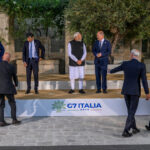Summary by Geopolist | Istanbul Center for Geopolitics:
This commentary originally appeared on Los Angeles Times on June 19, 2024.
North Korea has signaled an escalation in its “balloon war” with South Korea over the past month, sending hundreds of inflatables southward with payloads of trash and manure. A worthy South Korean response could involve using balloons to deliver upbeat news and K-pop music deep into the North—not just blasting it over loudspeakers at the border.
With the goal of reining in North Korean leader Kim Jong-un’s ongoing pursuit of nuclear weapons, South Korea could launch a balloon-borne offensive to deliver a greater quantity of positive information about conditions in the outside world and especially in South Korea, along with the optimistic strains of K-pop and the sagas of K-dramas. Once the South has shown Kim that it is willing and able to flood the North with such content, threats of a continuing deluge could inspire him to rethink his nuclear plans.
Here’s why. In the recent past, Kim has become paranoid about his people being exposed to outside information, particularly details about cultural touchstones and lifestyle advances in South Korea. North Korea is an impoverished and distressed country without freedoms, in contrast to its neighbor South Korea, a modern, globally engaged country with a population that enjoys freedom, opportunity, and wealth. Showing the North Korean people how their counterparts to the south live would at the very least be destabilizing for the regime. Kim’s recent behavior suggests that he is concerned that outside information is already contributing to instability in the North that could one day threaten his rule.
Kim’s recent behavior suggests that he is concerned that outside information is already contributing to instability in the North that could one day threaten his rule.
A new balloon offensive could threaten to repeatedly target Pyongyang with payloads of a million or so USB drives, each loaded with South Korean music and TV shows and with messages to the North Korean elite. The necessary inflatable delivery technology already exists: South Korean activists have developed “smart balloons” that could target USB drops over specific parts of Pyongyang and also carry speakers.
Such an offensive could prod North Korea toward shutting down one or more of its nuclear weapon production facilities or abandoning plans for a seventh nuclear weapon test—and South Korea should reward either move by ending the media bombardment. As long as Pyongyang refuses to yield in such meaningful ways, the drops should continue and expand.
A few years ago Kim called K-pop a “vicious cancer” corrupting the young in the North. His state media have warned that if left unchecked, it would make North Korea “crumble like a damp wall.” And what could be more scary to a third-generation dictator like Kim than having his regime crumble?
Kim apparently hopes that by portraying South Koreans as enemies of the North Korean people and imposing severe penalties on those consuming things from South Korea, he will be able to stop his people from learning about the outside world.
But these steps may only be delaying the inevitable: Many North Koreans don’t buy the Kim regime’s indoctrination, which risibly portrays North Korea as being a “utopia surrounded by a hellish outside world.”
Threatening an offensive featuring K-pop and other information deployed via balloons could be an important component of a campaign to influence the North Korean regime. In addition to million-drive airdrops, South Korea and the United States could use their media resources to support Korean-language reports about North Korean regime failures and human rights violations and the suffering of the North Korean people.
Washington and Seoul could also increase broadcasts into the North in ways that would circumvent or overwhelm North Korean jamming. And they could threaten to continue and even increase the recently restarted broadcasts along the Demilitarized Zone, which Kim would find objectionable in part because many of the North Korean soldiers in that area are from elite families who live in Pyongyang, families Kim particularly wants to isolate from outside information.
Threatening an offensive featuring K-pop and other information deployed via balloons could be an important component of a campaign to influence the North Korean regime.
Information efforts could also be increased elsewhere. For example, South Korea and the United States could distribute information and K-pop to North Korean diplomats and business people overseas, to North Korean front companies in various other countries, and to North Korean soldiers who are most likely on the Russian front lines supporting the use of North Korean artillery and missiles against Ukraine.
With survival of his regime on the line, the threat of an ongoing information campaign that relies on balloon drops, followed by the use of other technologies, could help prod Kim to step back from immediate plans such as another nuclear test and to rethink his overall nuclear ambitions. South Korea and the United States could tell Kim that if he does not accept a freeze on nuclear weapons production, his regime should be prepared to be rocked by a vast information offensive.
There is power in information, and Kim has repeatedly signaled that he is terrified by it. South Korea and the United States have few levers to apply against the North. Delivering information that could destabilize the regime is clearly one they should use.
Bruce W. Bennett is a senior international and defense researcher at RAND, a nonprofit, nonpartisan research institution.







